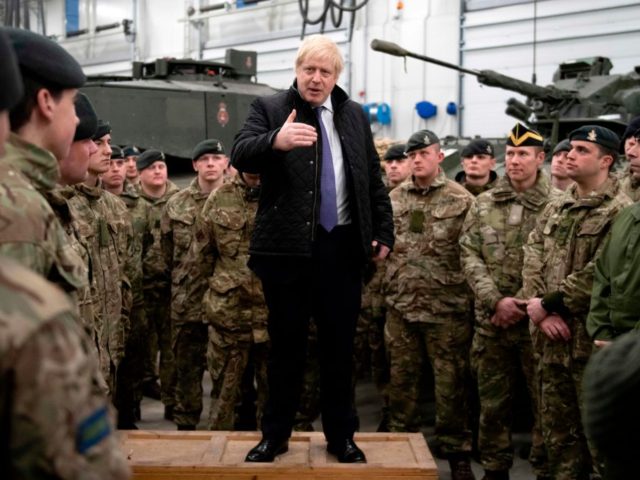A lying, untrustworthy, megalomaniacal oaf with totalitarian tendencies and strong family ties to Communist China has expanded his nuclear arsenal.
Normally this would be grounds for international concern and targeted sanctions. Unfortunately, in this case we may just have to grin and bear it because the burgeoning dictator in question is UK Prime Minister Boris Johnson.
According to an embarrassingly jingoistic piece in the Sun:
The nuclear deterrent will be upped from the current stock of not more than 180 warheads to not more than 260, amid fears other countries are “increasing and diversifying their nuclear arsenals.
This is part of a £24 billion defence spending splurge, presumably to be financed from a Magic Money Tree, called the Integrated Review.
The government and its useful idiots in the media are, of course, spinning this as a reaffirmation of British greatness post-Brexit.
According to the reliably dreadful Daily Telegraph newspaper headline, it’s a case of ‘Global Britain asserts itself with return to nuclear arms.’
And perhaps some Conservative voters will be stupid enough to take the message at face value. But they would do well to read the small print.
For example, the expansion of the nuclear deterrent appears to have come at the expense of Britain’s tactical capability – with swingeing cuts to all regular branches of the Armed Forces. The Sun notes:
But the RAF is set to lose 24 Typhoons jets, its 13 strong fleet of Hercules transport planes and the Queen’s four remaining VIP jets.
The Navy will lose two specialist sub-hunting frigates, HMS Montrose and HMS Monmouth, as well as its 13 strong fleet of minehunters which are due to be replaced by drones.
The Army is set to bear the brunt of the cuts with commanders braced to lose 10,000 personnel, four infantry battalions, 77 tanks and 760 Warrior fighting vehicles.
So while Britain may be well prepared for nuclear standoff and Armageddon, it will be less and less able to deal with the smaller-scale regional conflicts which have characterised global geopolitics for the last seventy years.
Some might argue that it’s just as well that Britain will no longer have the capability to get embroiled in pointless conflicts like Tony Blair’s war in Iraq or David Cameron’s in Libya. But it will also denude Britain of its ability to project power in regions where it has hitherto been able to shape the narrative and develop its interests – everywhere from West Africa through to the Middle East to Afghanistan and beyond.
There’s also the issue of morale. Most Conservatives — or, as in my case, ex-Conservatives — are proud of the Armed Forces and the values they instil (at least when they’re not busy training everyone how to be woke).
The Army, for example, is still one of those institutions where we’re glad for our children to serve, for the values it imparts are the values that made Britain great: national pride, loyalty, camaraderie, personal responsibility, pluck, verve, good manners, courage, dash, self-sacrifice… We need our regiments and their traditions not merely to help protect us and kill our enemies but, at least as importantly, as a living repository of our core national values.
Paring them down to virtual non-existence will cause far more damage to the essence of our culture than anything our foreign enemies could achieve.
The decision also smacks of outdated, Cold War thinking.
I agree with (former RAF Tornado pilot) Mark Nicol, who writes in the Mail about his concern that we are still focused on imaginary conflicts with Russia when the real danger lies elsewhere.
And yet despite the bellicose content of the Government’s plans, there was widespread confusion and despair yesterday among defence-minded MPs over ministers’ hesitant approach to China and the failure to identify the country as a hostile state.
The description ‘systemic competitor’ smacked of not wishing to offend the Chinese and was in stark contrast to the rhetoric towards Russia, which is singled out as posing ‘the most acute threat to our security’.
Remarkably, there was scant mention of China’s vast and rapidly expanding naval and air forces, its unilateral territorial expansions or its occupation of island chains in international waters. The undeniable reality is that the strategic balance of global security and influence has shifted, if not entirely from Nato countries towards China, then much of the way there.
China’s influence is undoubtedly malevolent. Yet Britain’s defence review for 2020 to 2030 declines to declare China an enemy.
As defence analyst Professor Lawrence Freedman suggests in a Twitter thread, this ‘speculative’ conflict with Russia has more to do with fitting in with some kind of Euro defence initiative [so what exactly was the point of Brexit if we’re still part of a Euro army rather than an independent nation?] then it does with strategic reality.
I for one don’t feel remotely more safe as a result of Bojo’s dodgy Integrated Review. Just a lot poorer and a great deal more nervous about Britain’s future prospects.

COMMENTS
Please let us know if you're having issues with commenting.